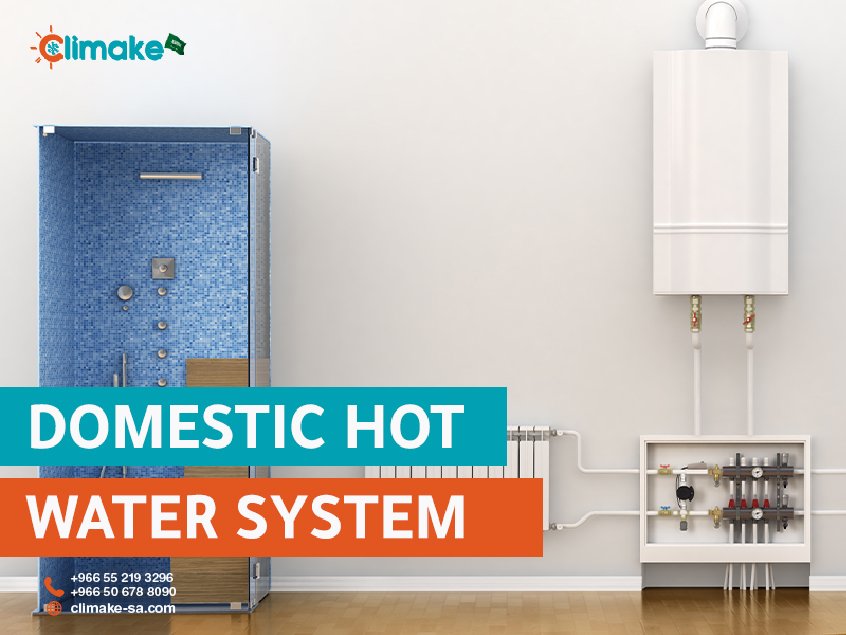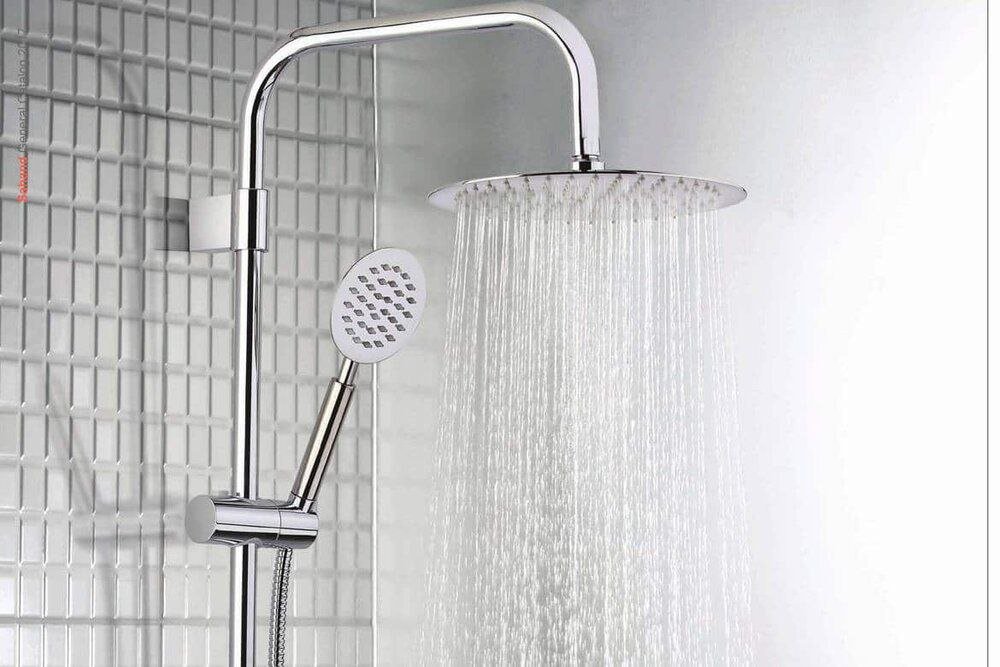Every home must have a domestic hot water system, particularly in areas with variable temperatures like Saudi Arabia.Have you ever pondered how to heat your home’s water most effectively? Or do you wonder how much a modern domestic hot water system could save you on your energy costs? In order to assist homeowners in making well-informed decisions regarding their water heating requirements, this book will offer comprehensive insights on DHW systems.
A central water heater for home is a vital investment for households seeking reliable hot water and energy efficiency. When planning a central water heater system design, it is important to consider household size, peak demand, and fuel type. A properly installed central water heater ensures consistent hot water throughout the home. Modern centralized water heater systems and centralized hot water systems provide efficient solutions, whether you choose a centralized water heater for home, a centralised hot water system, or a centralised water heater. Selecting the right central water heater system guarantees long-term comfort, reduced energy costs, and a sustainable solution for every home.
Businesses like Climake have realized how crucial dependable, effective, and ecological water heating solutions are in Saudi Arabia’s changing environment. Climake has emerged as a market leader thanks to customized solutions like their water heating and energy-efficient hot water boilers. In order to give you thorough guidance on home hot water system solutions, this article integrates insights from top international resources with Climake’s experience. Let us examine the different facets of household water heating.
What is a Household Water Heating System?
A domestic hot water system is the entire system that is put in place in homes to supply hot water for cleaning, cooking, and bathing, among other domestic uses. Usually, the system consists of a hot water tank, an electric or gas heating element, and a series of pipes that transfer heated water to various outputs. The objective is to swiftly and effectively provide water at the appropriate temperature.
Depending on the energy source, there are several water heating options. Some systems use gas, while others use electricity, solar energy, or even a mix of these to maximize efficiency and cost. A number of variables, including climate, household size, and local energy prices, will determine which system is best for your property.
Gas and electric water heaters are among Climake’s main options; they are made to consistently provide hot water without needlessly raising your gas or electricity bills. Sustainable resource management is another way that households may help by using energy-efficient water heating devices.
How Does a Household Water Heating System Work?
Cold water enters the house through the main supply pipe in a conventional domestic hot water system. It is then sent to the heater, which uses gas, electricity, or solar energy to warm it. After heating, the water is either stored in a hot water tank for subsequent use or flows straight to the outputs (as in instantaneous water heaters).
Climake’s systems effectively circulate the hot water, minimizing heat loss and guaranteeing that the water reaches the faucet at the proper temperature, particularly those that employ centralized hot water solutions. Hot water circulation systems, which keep the water flowing continuously and stop it from cooling down in the pipes before it reaches the user, are a feature of advanced systems.
What Types of Domestic Water Heating Systems are Available?
There are numerous varieties of domestic hot water systems that are appropriate for various household requirements:
-
Storage Water Heaters
These work well in large families with several users who need hot water at once because they store hot water in a hot water tank.
-
Instantaneous or Tankless Water Heaters
These systems are quite effective for smaller households with reduced hot water demands since they heat water just when needed, without storing it.
-
Solar Water Heating Systems
Climake provides solar water heating systems that are tailored to work well in the region. Domestic hot water systems use solar panels to harness the energy of the sun, which makes them perfect for sunny regions like Saudi Arabia.
-
Water Heaters with Heat Pumps
Heat pumps are more energy-efficient, particularly in warmer regions, because they transfer heat from one location to another using electricity rather than producing heat directly.
While each form of domestic hot water system has pros and cons, the main goal is to effectively supply hot water to the household.
What Advantages Do Home Water Heating Systems Offer?
Numerous advantages come with a well-designed domestic hot water system:
-
Energy Efficiency
With the use of contemporary technologies like energy-efficient water heating, advanced water heating solutions—like those offered by Climake—can drastically cut energy consumption and utility costs.
-
Increased Property Value
The value of your house can be increased by installing a top-notch central heating and hot water system. Potential buyers frequently favor houses with energy-efficient systems that reduce ongoing operating expenses.
-
Eco-Friendliness
Systems that lessen reliance on non-renewable energy sources, such as solar water heating systems, promote environmental sustainability.
-
Cost Savings
Over time, a domestic hot water system can help you save money by reducing energy waste.
How to Choose the Most Suitable Water Heating System for Your Home?
Numerous factors influence the choice of domestic hot water system:
-
Household Size
Greater capacity systems, like hot water supply systems that can manage several outlets at once, are necessary for larger residences or homes with more residents.
-
Climate
Solar water heating systems or gas water heaters that work effectively in warmer climates might save more energy in sunny places like Saudi Arabia.
-
Energy Source Availability
You can choose between an electric water heater and a gas water heater, depending on which energy source is more affordable and easily accessible in your area (natural gas vs. electricity).
What is the cost of installing and operating a water heating system in Saudi Arabia?
A domestic hot water system’s installation and maintenance costs can vary significantly depending on a number of factors, including:
- System Type: The initial and ongoing costs of various systems, including gas, electric, and solar water heating systems, vary.
- System Size: The cost of installing larger systems, such as those intended for large families or those with larger hot water tanks, is typically higher.
- Energy Source: Installation and ongoing operating expenses will be influenced by the price of solar, electrical, or natural gas equipment.
- Complexity of Installation: The cost of installing a domestic hot water system may be higher if it needs extra parts, like hot water circulation systems, or if it involves complicated installations, like installing a water heater for solar power.
The total cost of a domestic hot water system is largely determined by each of these criteria.
What is the Difference Between Gas and Electric Water Heating Systems?
There are clear advantages to both electric and gas water heater systems:
-
Gas Water Heaters
In places where gas is reasonably priced, these systems may be more economical and quickly heat water. They do, however, need enough ventilation to prevent gas leaks and other dangers.
-
Electric Water Heaters
Because they do not need gas connections, electric systems are easier to install and maintain. They also provide better temperature control, although operating costs may be higher depending on local energy prices.
Homeowners can select from Climake’s selection of gas and electric water heaters, which are made to satisfy a range of requirements, according to factors including household size, energy availability, and personal preferences.
How Can Energy Efficiency Be Improved in Domestic Water Heating Systems?
You may save a lot of energy by making your domestic hot water system more energy efficient. Among the tactics are:
-
Proper Insulation
The water will stay hotter for longer if you insulate your hot water tank and pipes to prevent heat loss.
-
Upgrading to a Tankless System
By doing away with the need to store hot water, tankless or instantaneous water heaters save energy while reheating saved water.
-
Using Solar Energy
By installing solar water heating systems, you may use sustainable energy sources and lessen your reliance on gas or electricity.
Learn more: Use an Efficient Central Heating System to Increase Comfort
How Can Solar Energy Be Used to Heat Domestic Water?
Through the use of solar panels, solar water heating systems absorb sunlight and transform it into heat.
After then, the water in a hot water tank receives this heat. In a country like Saudi Arabia, where solar energy is plentiful all year round, solar systems work especially well.
Contact Climake right now for customized domestic hot water system solutions with solar water heating that use cutting-edge technology to provide economical and hygienic heating solutions.
What is the Ideal Storage Capacity for a Water Heating System in a House?
The size of the household and usage habits determine the optimal storage capacity for a domestic hot water system. A family of four, for instance, might require a 150–200 liter hot water tank. Tankless systems or smaller hot water tanks may be preferred by smaller families or those with lesser water consumption.
What Challenges May You Face When Using a Water Heating System in the Egyptian Climate?
The climate of Saudi Arabia poses certain particular difficulties for home water heating systems. For example:
-
Heat Loss in Winter
Energy use might rise due to heat loss in water tanks and pipelines caused by cold temperatures.
Solution: To reduce heat loss, employ tankless systems and insulate pipes and tanks.
-
Overheating in Summer
Systems, particularly solar heaters, may overheat due to high summer temperatures, which could be uncomfortable and dangerous.
Solution: Reduce energy capture by installing solar panel coverings and using temperature control devices like mixing valves.
-
Water Quality and Scale Build-up
Hard water reduces efficiency by causing mineral buildup in pipes and tanks.
Solution: Put in water softeners and do routine maintenance and descaling.
-
Fluctuating Energy Supply
Electric water heaters are disrupted by power outages or irregular electricity in remote locations.
The answer is to use hybrid solar-electric systems with battery storage or gas water heaters as a backup.
- High Initial Costs for Solar Systems
The initial cost of installing solar water heating systems is greater.
Solution: Investigate financing options and offset expenses with long-term energy savings.
-
Water Availability and Pressure Issues
System performance is impacted by low water pressure or water shortages, particularly for instantaneous heaters.
Use hot water storage tanks to handle shortages and install water pressure boosters.
How to Ensure Safety and Security in Domestic Water Heating Systems?
When installing or using a domestic hot water system, safety is the most important consideration. The following are some crucial safety precautions:
-
Professional Installation
To prevent failures, always have certified professionals install your water heater.
-
Regular Maintenance
To guarantee correct operation, routinely check and maintain your gas water heaters, hot water boilers, and other parts.
-
Pressure Relief Valves
These valves are essential for avoiding pressure buildup, which can result in hazardous events like explosions or leaks.
Climake guarantees the safe and effective operation of your home water heating system by providing expert installation and maintenance services.
Choosing the appropriate domestic hot water system can significantly improve your home’s comfort, lower your energy expenses, and raise the property’s worth. For correct installation and best results, it is crucial to speak with experts, regardless of your preference for the rapid heating of a gas water heater or the sustainability of solar water heating systems.
Climake provides a range of services to suit the needs of all households, including professional advice and an exploration of the most effective water heating options in Saudi Arabia. Visit Climake today to find out more about their premium products or Domestic Hot Water System, or get in touch with them for a customized consultation. Or get on the phone right now and give us a call at these numbers:




